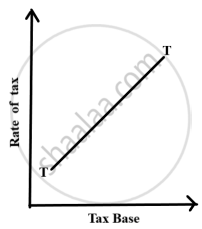Advertisements
Advertisements
Question
The tax whose rate remains unchanged irrespective of the income of the taxpayer is called as ______.
Options
Progressive tax
Regressive tax
Direct tax
Proportional tax
Solution
The tax whose rate remains unchanged irrespective of the income of the taxpayer is called as proportional tax.
Explanation:
The proportional tax rate remains constant regardless of the taxpayer's income, as seen in examples such as the Goods and Services Tax.
APPEARS IN
RELATED QUESTIONS
Match the following:
| 1. | Principle of taxation | Direct Tax |
| 2. | Estate tax | Goods and Service Tax |
| 3. | Excise Tax | Adam Smith |
| 4. | 01.07.2017 | Less elastic |
| 5. | Direct Tax | Indirect Tax |
Write name of taxation types and draw its diagram.
Which of the following statement is correct about GST?
- GST is the ‘one point tax’.
- This aims to replace all direct taxes levied on goods and services by the Central and State governments.
- It will be implemented from 1 July 2017 throughout the country.
- It will unified the tax structure in India.
In India taxes are collected by all the ______tiers of government.
Write about corporate tax.
Write a short note on Excise duty.
______ is imposed on the property of individuals depending upon the value of the property.
Excise tax in India ______ is levied by the Central Government.
______ is a liability to collect tax is that of shopkeeper but the burden of that tax falls on the customer.
Identify the type of taxation shown in the figure below.

